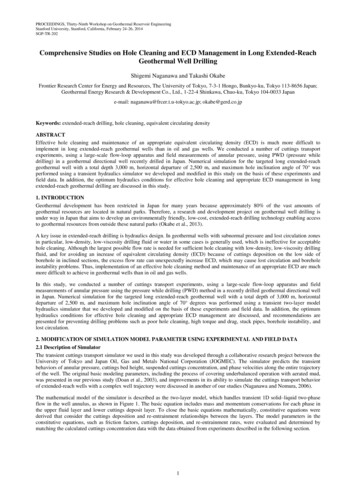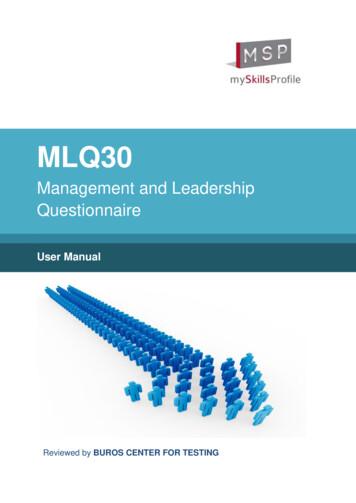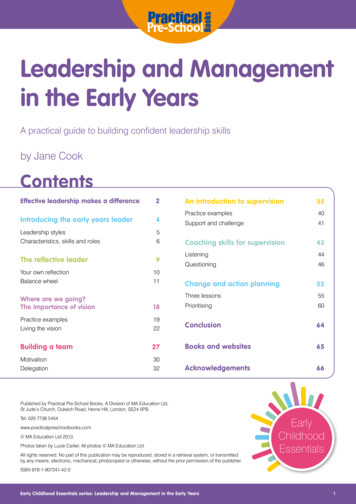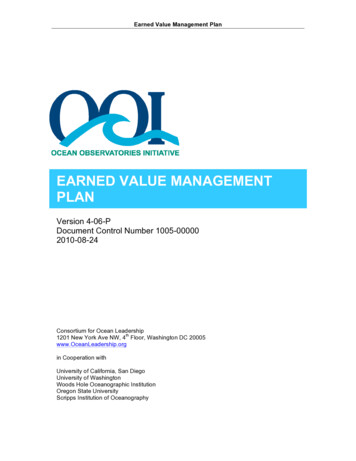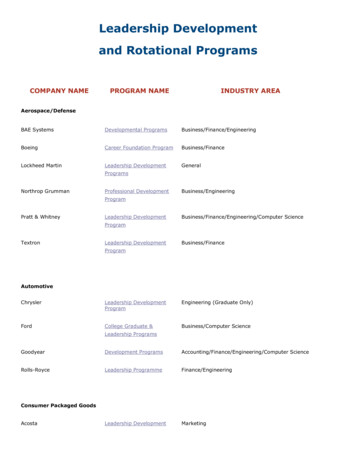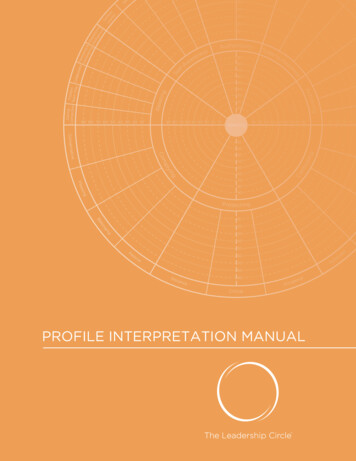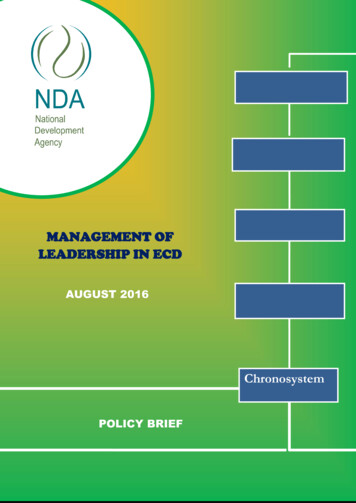
Transcription
2MANAGEMENT OFLEADERSHIP IN ECDAUGUST 2016ChronosystemPOLICY BRIEF
1. IntroductionSince 1994, South Africa has put in place policies and legislation intended to prioritiseECD as a critical component in the country’s overall social development. The SouthAfrican government has signed a number of international and regional agreements,such as the African Charter on the Rights and Welfare of the Child, and theInternational Convention on the Rights of the Child, and has committed itself tomeeting the aims of Education for All, and the Millennium Development Goals. Thegovernment has committed itself to uphold the rights of children through the SouthAfrican Constitution, and by introducing national legislation, policies and programmes,including the Children’s Act 38 of 2005, Education White Paper 5, and the NationalIntegrated Plan for ECD, and the National Development Plan.Education is a basic human right and is fundamental to building life-long learningand economic opportunities. According to South African Statistic and the Departmentof Education South Africa has a high rate of school enrolment with 97% of 11,4 millionschool-going age children in Grades 1 – 12 at an educational facility. Encouragingly,by 2011, 67% of five-year-olds were enrolled in Grade R, which suggests progresstowards the government’s revised goal of universal access to Grade R by 2014 (SouthAfrican Child Gauge, 2010: 99).The relevant government departments (namely the Department of SocialDevelopment, Education, and Health), has identified the need to increase access toECD programmes emphasising on management and leadership programmes/coursesthat practitioners are required to enrol for. As well as to enhance the quality of ECDprogrammes and services, specifically for children from disadvantaged backgrounds.Funding to both early Childhood development centres (birth to four years of age),through the Department of Social Development, and to Grade R (five to six years ofage) through the Department of Education (DoBE, DoSD & UNICEF, 2010) has beenincreased.
This brief will focus on the Management and Leadership in Early ChildhoodDevelopment Centres. Firstly one will identify the main purpose/aim of the policybrief, secondly the methodological approached will be outlined. Thirdly a briefdiscussion on institutional capacity will also be discussed. Lastly the leadership andmanagement programmes that help centres to run effectively and efficiently will bediscussed broadly.2. The purpose/aim of this policy briefThe main objective of this policy brief is to establish the underlying factors, keyissues and debates surrounding the above mentioned topic (Management andLeadership in ECD), to establish a theory based on the topic, which will informthe NDA Research Unit and for part of a research study.3. MethodologyThe methodology used for gathering information on this brief was a qualitativeapproach, this was carried out through document analysis, desktop research,articles, journals, and books review.4. Institutional CapacityAccording to the Guidelines for Early Childhood Development Services (Departmentof Social Development & UNICEF, 2006), it is crucial that administrative andmanagement systems are developed and put in place for the effective running of anECD centre. In order for ECD facilities to adhere to the minimum norms and standards,set by the Department of Social Development, specific processes and structures arerequired to be in place. The Tracking Public Expenditure and Assessing ServiceQuality in Early Childhood Development in South Africa study, (, Department of SocialDevelopment & UNICEF, 2010), showed that Community-based ECD facilities inSouth Africa appear to be less advanced in terms of financial management andgovernance than that of ECD facilities in the public School system.
According to the (Department of Social Development & UNICEF, 2010),The financialmanagement of many of the registered community-based ECD Facilities is poor; morethan 50% of these sites do not have many of the necessary Administrative documentsand structures in place, including such items as a petty cash book, which makes iteasier for ECDs to manage their financial resources efficiently. The study found thatonly 70% of community-based ECD facilities had annual financial statements, and ofthose who were recipients of the DoSD subsidy, only 77% could indicate how muchthey had received in 2008. Furthermore, only 61% of the facilities who charge centrefees were able to supply evidence on income from fees, and only 36% of all ECDfacilities surveyed kept salary disbursement records.Approximately 95% of community-based ECD facilities had a bank account and in veryfew instances were these bank accounts in the name of the owner or another personinvolved in the running of the facility, (DoSD & UNICEF, 2010). With regards to thegoverning bodies in community-based ECD facilities, in the Majority of cases, agoverning body exists and functions well (three percent of facilities. do not have agoverning body at all) (DoSD & UNICEF, 2010).5. Importance of leadership and management in ECD CentresTo run ECD centres which are efficient, sustainable and effective in caring for youngchildren, it is essential that ECD principals, supervisors, and teachers are trained.Training should be providedthrough full qualifications and through focused skillstraining programmes. In most cases training programmes are selected in relation tothe capacity of the ECD teachers participating in each project. ECD qualificationsinclude Further Education and Training Certificate: Early Childhood Development(NQF Level 4) as well as the Higher Certificate: Early Childhood Development (NQFLevel 5).Early Childhood Development (ECD) is a priority area within the South African contextand is supported by legislation, national policies and strategies. The development ofbabies, toddlers and young children forms the most critical foundation of further
development into childhood and adulthood. There is thus a vast need for ECDservices, and it is critical that the field should be served by competent practitioners. Inorder to meet the needs at ECD level, it is important to be able to identify and recognisecompetent ECD practitioners who are able to work in a variety of ECD contexts. Thequalifications will provide a means to give recognition to practitioners at an entry level,thus making it possible for practitioners to increase their employment prospects, andat the same time provide the field with suitably qualified practitioners.6. Leadership and Management in ECD(www.dgmtcommunity.co.za/organisational ) It is critical for ECDs to have GoverningBodies training that will help improves and strengthens the capacity and skills of ECDcentre Governing Body members.This training enhances the leadership,management and administrative skills of Governing Bodies, enabling them to lead andmanage their ECD centres more effectively and efficiently. The following programmesare presented in the Governing Body training: The vision and mission of the ECD centreAll ECD Practitioners and managers need to know and understand theirbusiness model, what objectives do the aim to achieve, their mission andvision. This will challenge staff members to boost performance by changingthe way they think and their approach in terms of meeting their targets The roles and responsibilities of Governing Body members and ECD Staffmembers
The allocation of roles and responsibilities for each ECD members is crucial, to avoidconflicts, for effective management and transparency each position has to be clearlystated. Financial managementResource allocated to each task, income/profit has to be managed efficiently, forgrowth and sustainability Governance and accountability.There has to be transparency and accountability for good working environment andrelationsConclusionBuild high levels of responsibility and ownership amongst staff members empowersstaff members to find solutions appropriately and timorously, it challenge staff them toboost performance by changing the way they approach things. The role ofmanagement and leadership in ECD centers will increase performance, developmentand growth not only for ECD practitioners but also for the development of children, asthey will be obtaining knowledge from competent practitioners and well establishedcenters.
Reference ListDepartment of Education (DoE).,(2009), The National School Nutrition Programme;Annual Report 2009/2010, PretoriaDepartment of Education (DoE).,(2006), School Realities 2006, Republic of SouthAfrica.Department of Education (DoE).,(2001), Education White Paper 5: Meeting theChallenge of Early Childhood Development in South Africa, PretoriaDepartment of Education (DoE).,(2001), The Nationwide Audit of ECD Provisioning inSouth Africa, Department of Education, Pretoria, South Africa.Department of Education (DoE), Department of Social Development, Department ofHealth & United Nations Children’s Fund (UNICEF)., (2005), National IntegratedPlan for Early Childhood Development in South Africa, Pretoria.Management-Leadership-ecd-sector, viewed 26 September 2016, from http://www.dgmt-community.co.za/organisational
Funding to both early Childhood development centres (birth to four years of age), through the Department of Social Development, and to Grade R (five to six years of age) through the Department of Education (DoBE, DoSD & UNICEF, 2010) has been increased. This brief will focus on the Management and Leadership in Early Childhood Development Centres. Firstly one will identify the main purpose/aim .
